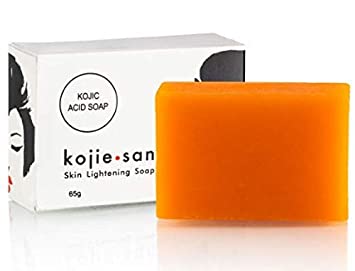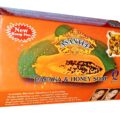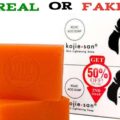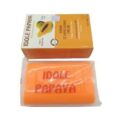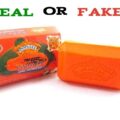Kojie San soap is a special all-natural kojic acid formulated soap that helps lightens dark spots due to acne, age spots, freckles, sun-damaged skin, and other skin pigmentations. Kojic acid is a chelation agent produced by several species of fungi, especially Aspergillus oryzae, which has the Japanese common name koji. Kojic acid is a by-product in the fermentation process of malting rice, for use in the manufacturing of sake, the Japanese rice wine.
Kojie San soap is a by-product in the production of Koji, or Malted Rice, for use in the manufacture of Japanese rice wine. In cosmetics, Kojic Acid is popularly known for its excellent whitening effects and antioxidant properties. In addition to skin-lightening effects, kojic acid also contains some antimicrobial properties. It may help fight off several common types of bacterial strains even in small dilutions. This can help treat acne caused by bacteria in the skin. It may also lighten scars from acne that haven’t faded yet.
Kojic acid also has antifungal properties. It’s even added to some antifungal products to increase their effectiveness. It may be useful in treating fungal infections of the skin like yeast infections, candidiasis, and ringworm or athlete’s foot. If soap containing kojic acid is used regularly, it may help prevent both bacterial and fungal infections in the body.
Kojie San Soap Side Effects
Despite the many benefits of Kojie San Soap, the soap also have some side effects. A review of kojic acid the major ingredient in Kojie San Soap suggested that there was a link to tumor growth when the acid was used in high concentrations. However, this link was weak since kojic acid is slowly absorbed into the circulation. It is unlikely that levels would become high enough to cause cancer in humans. According to the reviewers, the available data suggest that the use of products containing kojic acid with a concentration of 2 percent for products left on the skin is considered safe. Although the use of products containing kojic acid may be considered safe for most people, there are some risks and possible side effects.
Side effects may include:
The skin may sunburn easily
Sunburn is red, painful skin that feels hot to the touch. It usually appears within a few hours after too much exposure to ultraviolet (UV) light from sunshine or artificial sources, such as sunlamps. Using kojic acid-based soaps may make someone more likely to develop a sunburn. Melanin helps protect the skin from sun damage due to UV rays. Since kojic acid prevents melanin production, it leaves the skin more vulnerable to sunburn.
Contact dermatitis
Kojic acid can lead to contact dermatitis in some people, especially those with sensitive skin. Contact dermatitis can cause a rash, itching, and dry patches of skin. In severe cases, pain and blisters can develop. The concentration of kojic acid in creams, serums, and soaps may vary by manufacturer. Products with a higher concentration of kojic acid may be more likely to lead to irritation. In addition, anaphylactic reactions to coconut and coconut oil-based products like Kojie San soap are very rare. Contact reactions usually result in more mild symptoms, such as a skin rash or blistering on the skin.
Another reason coconut oil may cause skin upset in some skin types is interference with the skin’s microbiome. The lauric acid in coconut oil is such a potent antibacterial agent that it has been found to be stronger than Benzoyl Peroxide against Propionibacterium acnes, the bacteria known for causing acne. Also Read: Benefits and Side Effects of Asantee Papaya Soap


